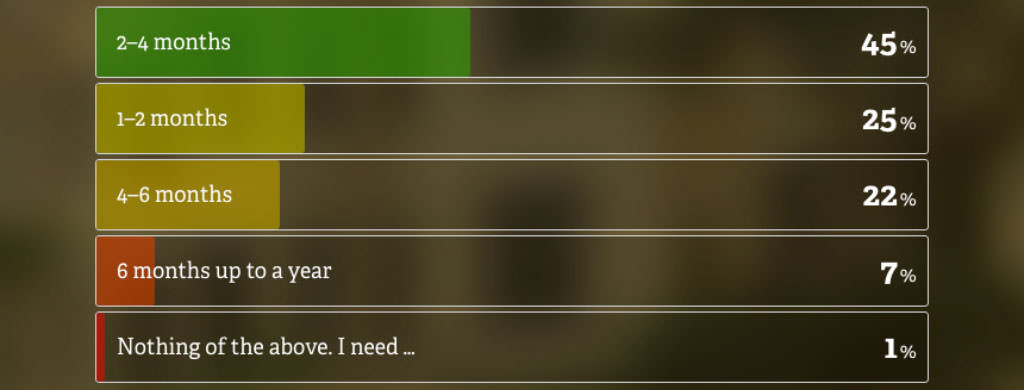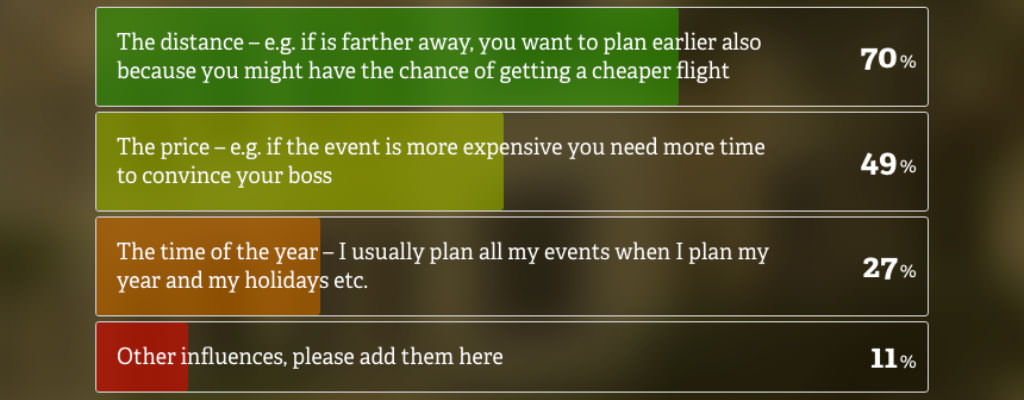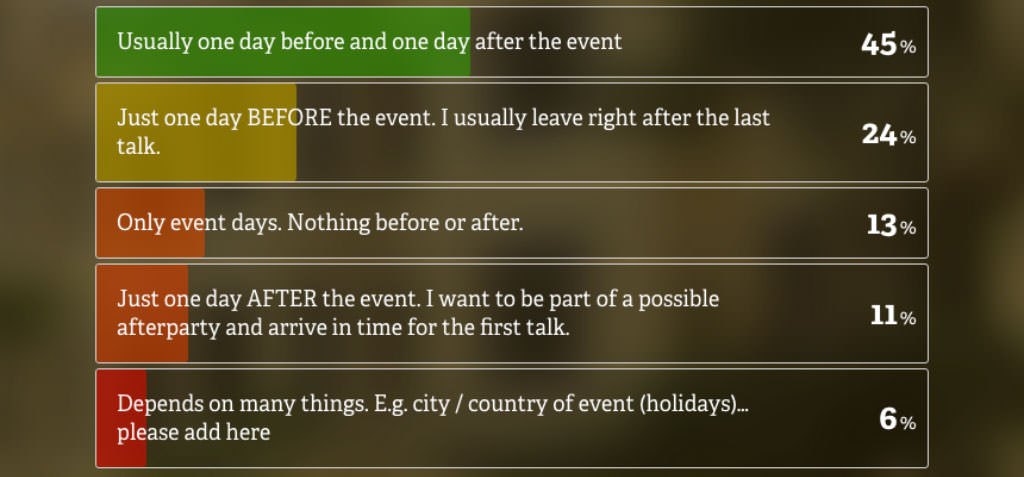How you plan your event journeys (survey results)
On January 5th, I created a little survey dealing with questions around how you plan and organise your trips to events like web conferences for example. Nearly 500 (494 to be exact) people took part in the survey. Therefore many thanks to everybody who helped spreading the survey.
The results are quite interesting from an event organisers perspective. I said, I’ll publish the results and here we go. You’ll find the numbers as well as certain answers, if they were given as a reason to an answer.
What's the average lead time you need / prefer for planning your conference visits?
The answers to this question are not only interesting to see how long in advance you should announce your event, but they also give you an impression when to start selling tickets and get as much information for your event together to help possible attendees make their decision.

As you can see, most attendees need a rather short time to plan their event journeys. If you take the first and second answer, 70% need only between 1 and 4 months. It means, that if you have your act together around 4 months before your event opens the doors, it’s good.
Interesting also to see a few of the comments made. Tobias, for example, writes:
I like to plan 2-6 weeks in advance. But due to early ticket sales and getting permission from the employer, I need 6-8 Month.
Two issues are shown here:
- Events releasing early bird prices force possible attendees to act early to get the cheaper price. In this case even though Tobias is employed.
- Employees often need longer to get an OK from their boss, which leads to the fact that they have to know of an event early enough to ask for permission. That means if you are too late with announcing your event, you might even fall off this person’s radar.
Łukasz says:
I start planning when I have tickets – it does not matter if that is 2 or 10 months (but above 3 months allows better stay and flight choice)
In this case Łukasz is self employed or freelancer and has the opportunity to act quickly. He might hear of an event, checks line-up and topics and maybe what other people say about it and books his ticket. After this he sorts out travel and hotel. But as you see he also mentions, that if flying is involved, being early is an advantage to get cheaper flights maybe.
In conclusion you can say, the earlier you announce your event, the better. Perfect time might be between 4–6 month before to announce dates and some facts about the topics and focus of the event. With this information the early birds might have a chance to already get an idea of your event and ask their boss. In addition to this, it won’t harm to also have at least a hand full of speakers announced about 4 month prior the event, to give a more detailed impression.
But let’s see what you have said …
What influences the time you need / take to plan your event trip?
To get a better idea why you have chosen the timeframe mentioned above, I asked a few questions about the reasons and influences.

Nearly 300 people have said, that the price is less crucial than the distance. For me this was quite a surprise. I would have said, that price wins over distance. Also interesting is the fact, that nearly on third of you is making a decision based on the time of the year, which means that these people may be very organised and plan their whole year (or parts of the year) early in advance. In relation to this I checked how many of those given time of the year as a reason would be employed or not. I guessed that more would be employed as you have to arrange your time with colleagues, you boss and maybe also with your family in addition. But the results say that this doesn’t matter as exactly 50% are self employed and the other 50% employed.
Over 10% have chosen “other reasons”. So let’s have a closer look at this.
Interesting is that some of you combine private journeys, like holidays, with your work related journey. Like Jody (freelance / self employed), who says:
I typically integrate events into holidays with my wife. She gets a couple days in the city, while I attend. Then we both have a vacation together before/after the conference.
Or as someone else (employed) says:
Other meeting opportunities in the event city and/or possibilities to attach private components, if it is only for sightseeing
Another big mention has been “Kids” and “Family” and with this not only that people mentioning kids and/or family need to book early in advance, but also the other way around: they sometimes book their ticket and, with this, sort their journey out very spontaneously.
I think it is nice to see that events seem to integrate into private live quite well. If time and money allows people seem to spend some extra days to combine conferences with private journeys.
But let’s see how many of you spend some extra days around an event, whether it is for networking opportunities, work related combinations, such as to meet and stay in touch with business partners, or private reasons (meeting family and friends, adding extra time for holidays).
How much time do you usually plan around an event?
Nearly half of you have said they do what I do mostly and stay one day before and after the event.

As I said in the post to the survey already, I also like to use events to network with people I know and to meet new people. For me this is really important as otherwise I could also simply watch the videos online.
96 people, which is nearly 25%, have said they like to come earlier, to not miss the first talk in the morning, but leave right after the last talk. This is, when you as an event organiser fear that your event does not run late, so that people have to leave to catch train or flight within the last talk.
Answering this question also heavily depends on a few things. As I said in the question already, it depends on the city of the event. Is it a city that is nice to visit or that I always wanted to visit anyways. Or is a city I always wanted to go to nearby for example. Like Charis says:
Most of the time 1 day before. When the city is nice, eg. Brighton, I might take one or two extra days
… which exactly reflects what I said above.
Or to mention another criterion: time. Like Dan says in his statement, pointing to what i said in the question already:
Pretty much what you've said in the placeholder, depends hugely on where it is, travel / accommodation plans, family commitments
But overall the answers to this question give a good feeling about how people think and decide in general, I think. And for all answers the cut between self employed or employed have been nearly 50/50, so that this really does not matter.
Sum Up
I think with nearly 500 people from all around the world taking part in the survey, this gives a pretty good impression and in the end is useful for anybody who wants to run or is running an event. 58% who took part are employed and 42% are self employed or freelance, which also is a really good rate to get enough answers from both groups.
Again: Thanks a lot for taking part in this raffle and see you at one of the many events around the world!